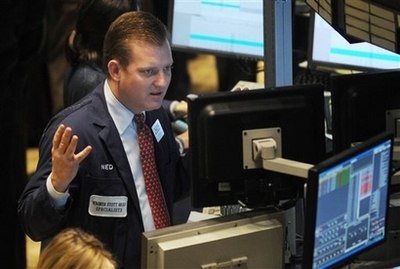Wall Street braces for more volatility
Updated: 2008-01-28 09:00
NEW YORK -- Investors are exhausted after their whipsaw week, but they're not ruling out another one. All the assumptions Wall Street made when it recovered from steep losses last week -- that the Federal Reserve will cut rates again, that President Bush's stimulus plan will proceed, and that any recession that occurs might actually be shallow and quick -- are going to be tested.
|
|
On Monday night, Bush will make his State of the Union address. If it looks like the proposed $150 billion tax rebate for Americans could hit a snag in Congress, the markets' fears about consumer spending could balloon again.
Then on Wednesday, the Fed -- which helped put a floor under the market last week by making an emergency, three-quarter-point rate cut -- will finish its two-day meeting and release its rate decision. A failure to deliver the quarter-point reduction traders are betting on, or signs that the Fed is hesitant to loosen its policy further, could send stocks sliding.
And Friday, two snapshots of US manufacturing and employment will tell investors how the economy fared in January. Economists expect jobs to increase but manufacturing activity to contract.
Wall Street, which lived up to its fickle reputation last week, could even be disappointed if it gets exactly what it wants but little else.
"If their expectations are met, they quickly ask, what's next?" said Alan Gayle, senior investment strategist and director of asset allocation for Trusco Capital Management.
Last week, after plunging, posting its biggest one-day upswing in five years and then capping the week with a loss, the Dow Jones industrial average finished the week up 0.89 percent. The blue chip index, down 8 percent since the beginning of the year, is on pace to log its worst January since 1960.
The Standard & Poor's 500 index finished the week 0.41 percent higher, while the Nasdaq composite index closed down 0.59 percent.
"If we're not at a bottom, we're probably very close," said Anthony Conroy, managing director and head trader for BNY ConvergEx Group. But, he added, the market is mercurial because there are many questions still unanswered -- a big one being, how risky is the debt on banks' books right now following their bad bets on subprime mortgages?
"Volatility won't be over for a while," Conroy said. "These credit issues don't go away overnight."
And neither do worries of a recession without hard evidence that the United States is not headed for one.
According to Michael Sheldon, Spencer Clarke LLC's chief market strategist, the dramatic lows reached in the stock market last week could make for a multi-week rally, but that more ground may be lost in the coming months. He noted that in the 11 recessions since World War II, on average, stocks fell 26 percent, the recessions lasted 10 months and Wall Street bottomed out six months into them.
One can only determine a recession in hindsight, but investors will try to use what data they can to piece together an accurate picture.
The Commerce Department releases on Monday a report on December new home sales, on Tuesday a report on December durable goods orders, on Wednesday, its first estimate of fourth-quarter gross domestic product, and on Thursday, a report on December's personal spending.
Meanwhile, Dow companies such as American Express Co., McDonald's Corp., Verizon and ExxonMobil Corp. report earnings this week, as well as other major names including the recently acquired Countrywide Financial Corp., Starbucks Coffee Co., homebuilders Centex Corp. and Pulte Homes Inc., and Internet companies Google Inc. and Yahoo Inc.
|
|
|
||
|
||
|
|
|
|
